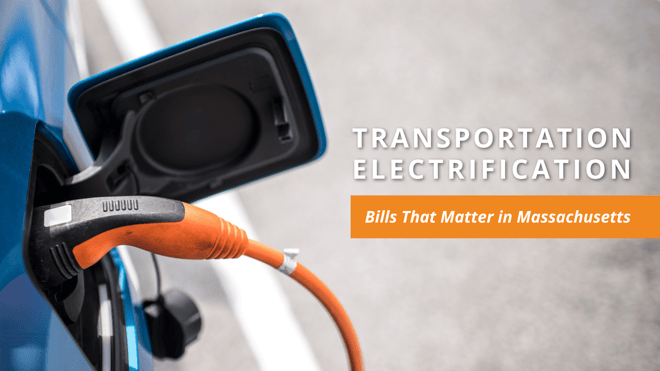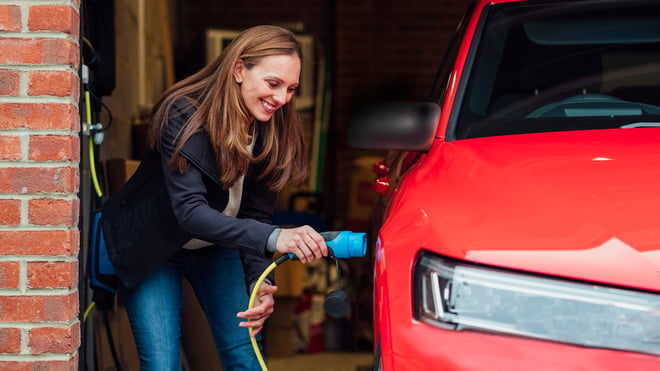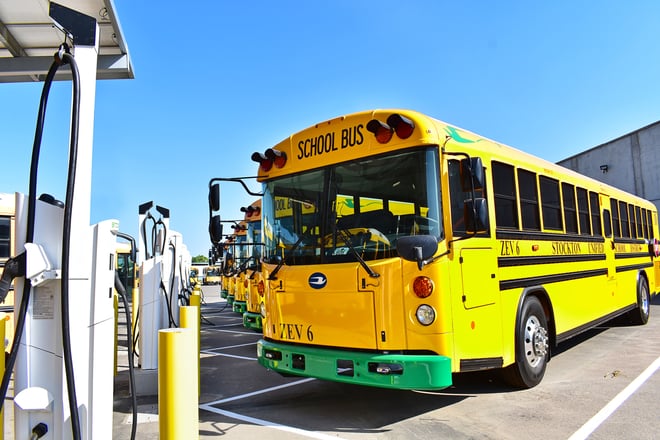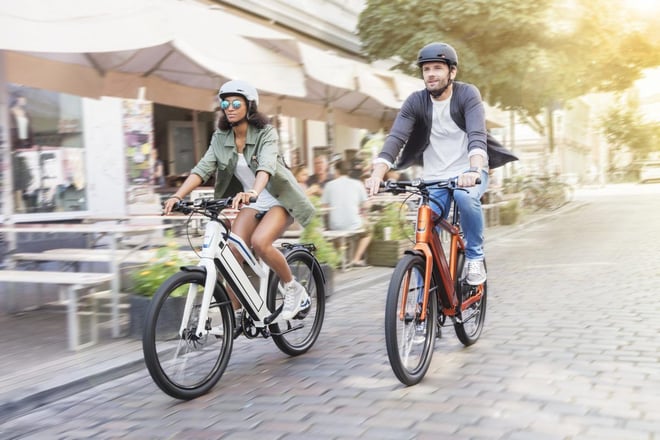Rhode Island Must Get Serious About Decarbonizing Buildings
The Act on Climate is one of the strongest climate policies in the nation, mandating that Rhode Island reduce its...

Per the Clean Energy & Climate Plan for 2025 and 2030, Massachusetts must reduce greenhouse gas emissions in the transportation sector 34% by 2030 for the economy as a whole to cut emissions in half compared to 1990. Last year’s climate bill made some good progress on this front: adjusting the state’s MOR-EV rebate, creating a fund to support the build-out of charging infrastructure, committing to a phase-out of new gas-powered cars by 2035, and setting timelines for MBTA bus fleet electrification. Though a promising start, there’s much more to be done. Here are the transportation electrification bills we’re prioritizing this legislative session. This list may change as the session progresses, but here’s what we have our eye on now.
Last year’s climate bill made several important changes to the state incentive program for electric vehicles (MOR-EV) and set up funds for electric vehicle (EV) incentives and EV charging incentives. The economic development bill that passed in the fall then filled those two funds with $50 million each, but we are still waiting for all the changes to MOR-EV to be implemented.
To reach our climate goals, we need 900,000 of the 5.5 million vehicles on the road in Massachusetts to be electric by 2030, which means about half of the new car sales will need to be electric by that year. These pieces of legislation put us on the right track to increase EV adoption to the scale we need, but more can – and needs to be – done. That’s why we’re excited by these two new pieces of legislation.
| Sponsors | Senator Cindy Creem (Bill S.2208) & Representative Steve Owens (H.3398) |
| Summary | This bill directs the registrar of motor vehicles and the Department of Energy Resources to add a fee to the purchase or lease of new gas-powered cars that cost more than $60,000. All the revenue generated by this fee would flow into the Electric Vehicle Adoption Trust Fund. |
| Why We Need It | Historically, the state MOR-EV program (and MOR-EV Truck) has been funded with proceeds from the Regional Greenhouse Gas Initiative (RGGI) auctions. There are many competing needs for those RGGI funds, and we know upfront EV incentives will be critical until EVs reach cost-parity with gas-powered cars later this decade. This bill provides an additional stream of revenue for the state MOR-EV program that doesn’t burden drivers who purchase used cars or new vehicles that cost less than $60,000. |
| Fact Sheet | Available here. |
| Sponsors | Senator John Keenan (Bill S.2140) & Representative Steve Owens (Bill H.3204) |
| Summary | This bill directs the Department of Public Utilities to open a proceeding calling for off-peak charging rebates that include values for ALL the benefits of charging off-peak: avoided energy and capacity costs, avoided transmission costs, avoided distribution costs, improved grid reliability, capacity benefits in the form of demand induced price reduction effects, avoided GHG emissions, and public health benefits. |
| Why We Need It | Off-peak charging rebates are a win-win-win. They’re good for EV drivers because they lower the cost to refuel. They’re good for non-EV drivers because they make better use of our electric grid and push electricity rates down. They’re not a cross-subsidy, just an accurate reflection of real-time costs of service, and they’re implementable now via vehicle telematics and/or smart charging stations. Having substantive off-peak charging rebates in place in Massachusetts would BOTH protect our grid AND incentivize EV adoption. |
| Fact Sheet | Available here. |
 Source: Getty Images
Source: Getty Images
In addition to these two new bills, there are several bills that reintroduce ideas that didn’t get passed last legislative session. These three bills are all priorities of the Zero Emission Vehicle Coalition, of which we are a part.
| Sponsors | Senator Brendan Crighton (Bill S.2217) and Representatives Steve Owens and Jennifer Balinsky Armini (Bill H.3392) |
| Summary | This bill sets a deadline for the electrification of the MBTA commuter rail, prioritizing the routes that serve environmental justice populations, and calls for service frequency standards. |
| Why We Need It | Our commuter rail runs on diesel fuel, which causes disproportionate harm both in terms of greenhouse gas pollution and the pollution that harms human health. Electrification would protect the health of the communities the commuter rail passes through, reduce greenhouse gas emissions, and allow for more frequent service. |
| Fact Sheet | Available here. |
| Sponsors | Senator Brendan Crighton (Bill S.2218) & Representatives Joan Meschino & Christine Barber (Bill HD.1543) |
| Summary | This bill directs the Department of Energy Resources (DOER), the Department of Environmental Protection, the Department of Public Utilities, and the Department of Transportation to together develop a transition for school buses, public vehicles, and vehicles serving a public purpose, issuing regulations to reach 50% of fleet electric by 2025, 75% by 2030, 100% by 2035. It calls for the prioritization of fleets serving environmental justice populations and also directs DOER to create a program to incentivize the electrification of private fleets. |
| Why We Need It | Fleet vehicles make up a large chunk of the vehicles on our roads and need to be electrified, too! School buses in particular cause disproportionate emissions and harm the health of the pupils they transport. |
| Fact Sheet | Available here. |
| Sponsors | Senator Oliveira (S.2285) & Representative LeBoeuf (H.3366) |
| Summary | This bill sets a schedule by which new vehicle purchases by regional transit authorities (RTAs) must be electric, starting at 40% in 2025 and reaching 100% in 2035. It also directs the Department of Transportation to create a central planning and procurement office that will create electrification plans for each RTA. |
| Why We Need It | Last year’s climate bill included a schedule for the electrification of MBTA buses, but largely left the RTAs untouched. Many people across the Commonwealth rely on RTA bus service and deserve access to clean public transportation as well. |
| Fact Sheet | Available here. |

There are so many transportation and electrification bills filed this session, it was hard to prioritize. Here are a couple of bills we’re keeping an eye on too.
 Source: Stromer via Forbes
Source: Stromer via Forbes
In the coming months, these bills will be heard in hearings in different committees in the legislature. We’ll be there to testify in support – and we’ll let you know how you can offer your comments, too! Stay tuned.
The Act on Climate is one of the strongest climate policies in the nation, mandating that Rhode Island reduce its...
As frequent readers of our blog will know, transportation is the largest source of greenhouse gas emissions in...
Comments